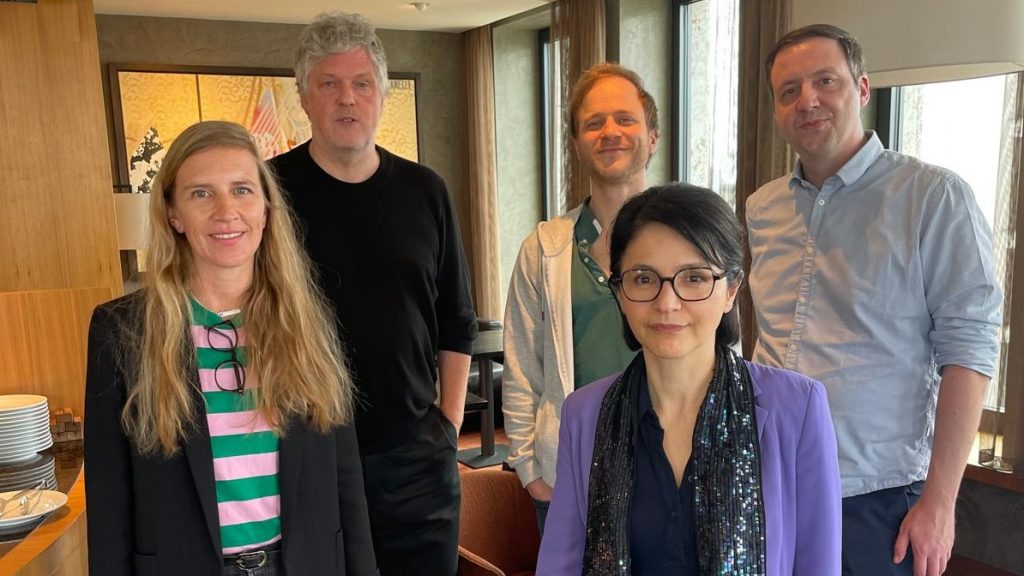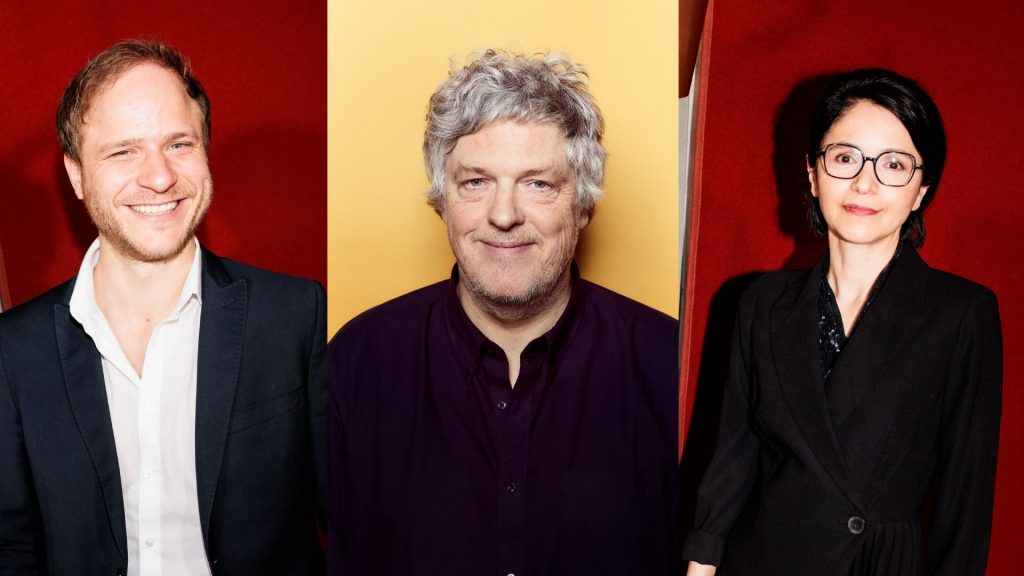The nominees Ayşe Polat, Matthias Glasner and Adrian Goiginger kick off the final week of the German Film Awards with their screenplay roundtable. They discuss the limits of the filmability of thought.

Ayşe Polat is nominated for „In a Blind Spot“, Matthias Glasner for „Dying“ and Adrian Goiginger for „The Fox“ in the Best Screenplay category at the German Film Awards 2024. In an exclusive SPOT roundtable they discuss where the limits of writing can lie during filming.
The three of you have both directed and written the screenplay. Your films are very personal. When writing, do you actually pay attention to subsequent filmability?
Ayşe Polat: When I write a screenplay, I also assume that I will make it into a movie. Otherwise I wouldn’t write it. Sometimes I write a screenplay and realize that I don’t like it. But normally I don’t sit down and start until I’m sure. I’m sure it’s similar for both of you. Because they’re not ideas that come to you on a whim. You carry them with you for several years. They grow and grow. If I realize that I’m still interested in a topic two years after I first touched on it, that’s a good sign.
Adrian Goiginger: Anything can be filmed if you have the necessary funds. With my film, it was difficult with the foxes because there is no reference film. There hasn’t yet been a movie with real foxes in the leading role. I didn’t even know if it would work. I only knew that I didn’t want CGI foxes. For me, the only option was to make the movie with real foxes. Otherwise I would have left it alone. I asked the animal trainer, who said: With a lot of money and time, it might be possible. In the end, we found out on set whether it would work. But I like challenges like that. We trained the foxes for two years. I took the script to the animal trainer for a reality check to find out what was even possible. Then he immediately cut out half of it. But when he told me what was possible, I used that as input for the screenplay.
Matthias Glasner: But the animal trainer already had experience with foxes and knew what would work?
Adrian Goiginger: With foxes in general, yes. But not as the lead in a movie and with different age groups. We had six foxes in total: four puppies and two adults. We filmed in April and the puppies weren’t born until the end of February. In mid-February we were still joking: the main character hasn’t been born yet! The whole thing was a big team effort. Our lead actor Simon Morzé helped raise the adult animals a year before the shoot.
„In mid-February we were still joking: the main character hasn’t been born yet!“
Adrian Goiginger
Matthias Glasner, did you pay particular attention during the writing process of „Dying“ to ensuring that the whole thing could be filmed?
Matthias Glasner: No, I didn’t in this case. I actually had decided beforehand that I wanted to write something that isn’t concerned how it will be sold. I needed a clear head because I had written a lot before that where I knew I was writing for a production. In the case of “Dying” helped me a lot because I didn’t even know if I wanted to do anything with it. The topic was so private that I kept asking myself the question while writing: Do I really want to make this movie? But that was also liberating. At the end of the writing process, it was important to me, because it was written from such a somnambulistic state, never to look back, but always to look forward, until I was at 197 pages. Then I read it for the first time and really liked it. I also realized that there was still a lot of work to be done. But when I worked on it in the months that followed, I never liked what I changed. It came too much from analyzing how it could be done better. These changes were then dropped again.
Adrian Goiginger: What percentage of the original script is in the finished film?
Matthias Glasner: Most of it. Maybe 90 percent. I changed very little. I made cuts. Nobody talked me into it either, because everyone knew it was my thing. They were probably also afraid to say anything to me because they knew how personal the story was. It was always clear: either they do the project or they don’t do it. But if they do it, they’ll do exactly this script.
Adrian Goiginger: What kind of budget did you have?
Matthias Glasner: When I was writing, I thought: the movie mustn’t cost any money because the project isn’t commercial. But at the same time I also thought: I need the Berlin Philharmonie as a location. I can do everything else the same way. Originally, I thought the project could be made for three million euros. I was naive. I’ve produced all my films myself. I actually know about things like that. The first calculation then said that it would cost at least seven or eight million euros. That’s when it became difficult. Everyone said: in the current circumstances in Germany, an arthouse film called „Dying“ that costs seven million euros, phew. The first sponsors also turned us down. The BKM was important because they funded us in full. Hamburg was good, then NRW also supported us and, interestingly, so did the FFA, which is relatively rare. But then we still didn’t have seven million. So I put most of my salary into it, as did the producers. My own money was 1.4 million euros.
Adrian Goiginger: Were there any special fees for the actors?
Matthias Glasner: Yes, everyone had special fees – team and actors. Everyone had to cut back a bit. We had 55 days of shooting.
Ayşe Polat: Did you already know who you were casting while you were writing, Matthias?
Matthias Glasner: With Corinna Harfouch, yes. I had already worked with her many times before. She’s a good friend. It was clear that I had written the role for her. She wasn’t that enthusiastic at first. Your mother, she said, I thought I was your lover. I also had Lars Eidinger in mind. But I was annoyed that he is currently so present and does so many films. When I told Corinna that, she took me and shook me. Nonsense, Lars is great, she said. It doesn’t matter how often he’s in a film. He’s just right.

What is it like for you two, Ms. Polat and Mr. Goiginger? Do you write with certain actors in mind?
Ayşe Polat: I think it’s actually quite good if you already have actors. Then you can write the script accordingly. With „In the Blind Spot“, it was clear that a child would be the focus. It was a question of patience. I knew that somewhere there was the right little girl. I just have to look long enough to find her. I took my time – that was two years. The Kurdish mother in the first part of the film is an amateur actress who memorized lines for the first time. For „In the Blind Spot“, it was mostly Turkish actors. Most of them are also known in Turkey because they play a lot in series. In Germany, we were often asked why these popular actors were in such a politically controversial arthouse film. The answer was always: because they liked the book.
Adrian Goiginger: Did the actors risk something in their country with this performance?
Ayşe Polat: For example, there is the role of the protagonist’s boss. A rather small but very important role. I met with several actors in the 60 to 70 age group. Actors in this range who are still in the business are also rather well-known. Many of them turned me down on the grounds that they would have played a big role. But they didn’t want to risk playing such a small role because, in theory, they could have lost advertising contracts: If the whole basis of life were to fall away. There was definitely a fear.
Adrian Goiginger: I didn’t have any actors in mind for „The Fox“. My great-grandfather left me 200 original photos from the wartime period in which the film is set, which he took himself with his camera. He is often in them himself, shot with a self-timer. Selfies in World War II, you would say today. So I had my great-grandfather in mind when I was writing. I came up with my main actor Simon Morzé because he looked like my great-grandfather. At the same time, I realized that he wasn’t really suitable for the role: He didn’t speak the right dialect, didn’t have a driver’s license and hadn’t been in the army. He didn’t even have any pets. But luckily he had the talent and commitment to prepare exclusively for the role for two years. He worked on a mountain farm and learned the language.
Matthias Glasner: I find the actor Alexander Beyer with you in „Fox“ so surprising. I’ve already filmed with him twice and I really like him. But I thought it was an interesting idea to see him as a Nazi soldier, because I don’t see him as a soldier at all, rather much softer. Was that your wish to cast him against his other role profile?
Adrian Goiginger: I read books by Ernst Jünger beforehand. I couldn’t imagine him as a fighting soldier because his writing was so literary. But the higher you are in rank, the less you have to fight in the war. They all had a soldier below them who was always the attack dog. For us, that was the actor Pit Bukowski. I really wanted to have this dynamic in the movie: The officer as an artist who doesn’t really care about anything and his attack dog. With Nazi characters, it’s also very easy to fall into cliché traps if you cast them badly. In the casting, Alexander Beyer made the role so non-military. I liked that immediately. Everyone else tried to act more like Christoph Waltz. Beyer played the role like it was a job for the guy.
The interview was conducted by Barbara Schuster and Michael Müller
